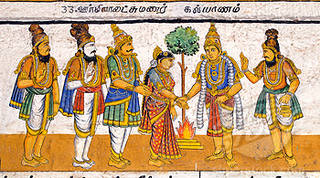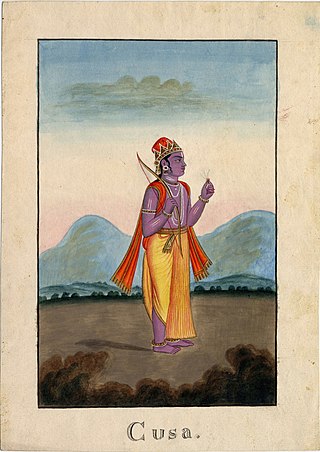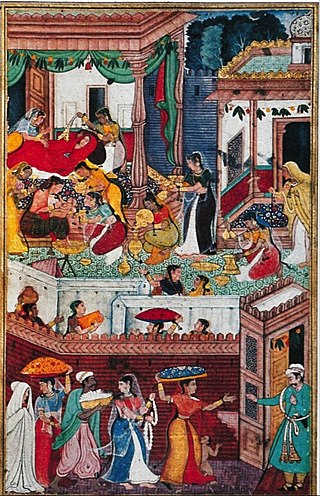
Lakshmana, also known as Laxmana, Saumitra and Ramanuja, is a Hindu god and the younger brother of Rama in the Hindu epic Ramayana. He is considered as an incarnation of Shesha, the lord of serpents. Lakshmana was married to Urmila, and is known for his loyalty and dedication towards Rama.
Lava is molten volcanic rock or the resulting solid rock after cooling.
Kush or Cush may refer to:

Urmila, is a Hindu goddess and the princess of Videha in the Hindu epic Ramayana. She is considered to be an avatāra of Nagalakshmi, the serpent goddess. Urmila was married to Lakshmana and is known for her dedication towards her husband, for her sacrifice.

Shrutakirti is a princess of Videha, in the Hindu epic Ramayana. She is the wife of Shatrughna and is considered an incarnation of the discus of goddess Lakshmi. Shrutakirti is known for her foresight and dedication.

Mandavi is a princess of Videha in the Hindu epic Ramayana. She is the wife of Bharata and is considered an incarnation of the conch shell of goddess Lakshmi. Mandavi is known for her sacrifice and perseverance.

Kusha and his younger twin brother Lava were the children of Rama and Sita. Their story is recounted in the Hindu epic, the Ramayana. Hindu traditions claim he ruled the entire region of Kashmir, Indus River and Hindu Kush as frontier lands of India known as Hindu Kush Kshetra and founded the city of Kashmir in the valley and Kasur with Lavapuri of Lava in base lands, though local lore contends Kasur was founded in 1525 by Pashtun migrants. His brother Lava is traditionally believed to have founded Lavapuri.

Kausalya is a queen of Kosala in the Hindu epic Ramayana. She is the first queen consort of Dasharatha, who ruled Kosala from its capital Ayodhya. She is the mother of Rama, the male protagonist of the epic. She is a secondary character in the Ramayana, so only aspects of her life are described in detail.

Arun Govil is an Indian actor and politician from the Bharatiya Janata Party. He is best known for portraying Lord Rama in the Ramayan TV series. He also appeared in films like Paheli (1977), Sawan Ko Aane Do (1979), Saanch Ko Aanch Nahin (1979), Jiyo To Aise Jiyo (1981), Himmatwala (1983), Dilwaala (1986), and Govinda Govinda (1994). He is currently serving as a Member of Parliament, Lok Sabha to Meerut Lok Sabha constituency from June 2024.
Luv Kush is an Indian television series that ran from 1988 to 1989. It was created, written, produced, and directed by Ramanand Sagar. It is a follow-up Ramayan, featuring mostly the same cast and production crew. Luv Kush covers the last book — the Uttarakāṇḍa — of the ancient Indian epic Ramayana, following Rama's coronation, especially focusing on his children, twins Kusha and Lava.

Lava Kusa is a 1963 Indian Hindu mythological film directed by C. Pullayya and C. S. Rao. Produced by Lalita Sivajyothi Films, the film is a remake of the 1934 production of the same name, which was also directed by C. Pullayya. The story is based on the Uttara Kanda of the Ramayana, focusing on Lava and Kusa, the twin sons of Rama and Sita. The cast includes N. T. Rama Rao as Rama, Anjali Devi as Sita, with Chittoor Nagayya, Kantha Rao, Sobhan Babu, S. Varalakshmi, and Kaikala Satyanarayana in supporting roles. The soundtrack features 27 songs, with the musical score primarily composed by Ghantasala.
Hanuman is a Hindu god and one of the most important characters in the Indian epic Ramayana.
The Mahabharata is one of the two major Sanskrit epics of ancient India, the other being the Ramayana.
Ramayana is one of the two major Sanskrit epics of ancient India.

Lava Kusa: The Warrior Twins is a 2010 animation film written and directed by Dhavala Satyam as a joint venture of Kanipakam Creations with RVML Animation.

Sri Rama Rajyam is a 2011 Indian Telugu-language devotional film directed by Bapu who co-wrote the film with Mullapudi Venkata Ramana, and produced by Yalamanchali Saibabu. The film stars Nandamuri Balakrishna, Nayanthara, Akkineni Nageswara Rao, Srikanth, and its music was composed by Ilaiyaraaja, which won him Nandi Award for Best Music Director. Sri Rama Rajyam is a remake of the 1963 blockbuster film Lava Kusa.

Lav Kush is a 1997 Indian Hindu mythological film, produced by Dilip Kanikaria under the Devyank Arts banner and directed by V. Madhusudhana Rao. It is based on Valmiki's Uttar Ramayan from the Indian epic Ramayana. The music of the film was composed by Raamlaxman. It stars Jeetendra as Rama, Jaya Prada as Sita, Arun Govil as Lakshmana, Dara Singh as Hanuman and Pran as Valmiki.
Shrimad Ramayan is an Indian Hindi-language television series that premiered from 1 January 2024 to 9 August 2024 on Sony Entertainment Television and airing on Sony SAB since 12 August 2024. Produced by Siddharth Kumar Tewary under the banner of Swastik Productions, the series is based on the epic Ramayana. It stars Sujay Reu as Rama and Prachi Bansal as Sita.
Lava Kusa is a 1934 Telugu-language Hindu mythological film directed by C. Pullayya and produced by Motilal Chamaria under the East India Film Company. The film is based on the play Lava Kusa, written by K. Subrahmanya Sastry, and marks an important milestone in early Telugu cinema. It was one of the first films to feature recorded songs, following the trend set by Sati Savitri (1933). All the songs in Lava Kusa were well received, contributing to its success.









